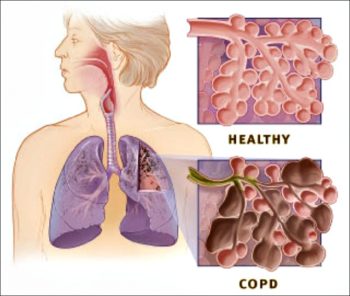
Chronic Obstructive Pulmonary Disease (COPD)
 Almost every Filipino knows the late comedian Dolphy, but not everyone knows that he died of COPD. Chronic Obstructive Pulmonary Disease, also known as COPD, is a lung disease characterized by difficulty of breathing. It is caused by exposure to irritating substances that have caused permanent damage to the lungs. Smoking is the number one irritant causing COPD. Other causes include dust, smoke belched by cars and secondhand smoke (from charcoal or wood fuel or from mosquito killer or “katol”).
Almost every Filipino knows the late comedian Dolphy, but not everyone knows that he died of COPD. Chronic Obstructive Pulmonary Disease, also known as COPD, is a lung disease characterized by difficulty of breathing. It is caused by exposure to irritating substances that have caused permanent damage to the lungs. Smoking is the number one irritant causing COPD. Other causes include dust, smoke belched by cars and secondhand smoke (from charcoal or wood fuel or from mosquito killer or “katol”).
People with this disease often experience difficulty of breathing, coughing, chest tightness, production of phlegm and wheezing (whistling sound produced when breathing). COPD patients can present as emphysema, chronic bronchitis or both. In emphysema, the tiny air sacs in the lungs are destroyed and have lost their ability to stretch making it hard to push air out. As a result, the body does not get the oxygen it needs. Patients having emphysema often feel they are “out of breath” even after doing a mild activity such as walking. In chronic bronchitis, the airways are inflamed, causing them to thicken and decrease the airway opening. The muscles surrounding the airways also tighten, making the airway passage even smaller so that lesser air is able to enter. The result is increased mucus production and the body tries to get rid of it by coughing. This kind of cough is also called Smoker’s Cough. Patients with COPD that is predominantly of the chronic bronchitis type have long-standing cough (weeks to months to years) with increased phlegm production. Many COPD patients have a combination of emphysema and chronic bronchitis.
There is no cure for COPD. However, there are medicines that can help the patients cope with the symptoms. It is important to know that COPD is highly preventable. The best thing to do to prevent COPD from developing is simply to keep away from irritants by not smoking or wearing a mask to avoid dust, fumes and secondhand smoke. Smokers who are starting to have smoker’s cough should also stop smoking ASAP, and consult a physician, because like with all illnesses, early treatment leads to better results.
Smoking cessation and proper medication can prevent progression or worsening of COPD, which if not managed well can be debilitating and life threatening.


No Comments